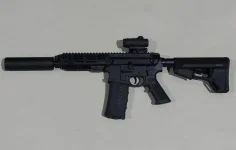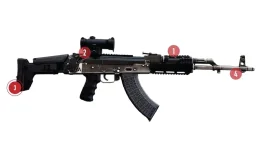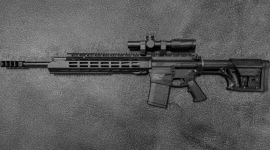- Views: 5K
- Replies: 52

New Delhi: The Indian government's recent decision to procure an additional 73,000 SIG 716 assault rifles from US manufacturer Sig Sauer Inc. has sparked intense debate. Vivek Krishnan, CEO of Bengaluru-based SSS Defence, expressed his frustration on social media, criticizing the government's ongoing preference for foreign-made weapons despite the much-touted "Make in India" initiative.
In a five-point post, Krishnan highlighted the difficulties faced by domestic defence manufacturers in competing with foreign companies, particularly when the government prioritizes imports over local production. He emphasized that SSS Defence, a company with a 70-year history and an emerging player in the Indian defence sector, has been diligently developing world-class small arms, yet these efforts seem overlooked.
Krishnan began his post by expressing disappointment with the government's decision, stating that a private solicitation with an emphasis on Indian design and content would have easily identified suitable domestic contenders. He questioned the seriousness of the "Make in India" initiative in the defence sector, pointing out hurdles faced by Indian manufacturers and stressing the need for greater support and patience to foster indigenous weapon development.
He further criticized the government, stating that the private sector is attempting to undo the damage inflicted by government-owned companies over the years in defence manufacturing. He challenged the Indian Army to test SSS Defence's rifles against global benchmarks and make the results public, as "real serious armies" do.
Krishnan's post triggered a debate, with several prominent journalists, ex-servicemen, commentators, and former bureaucrats voicing their opinions. Ravi Kumar Gupta, a former DRDO scientist and commentator, backed Krishnan and urged Indian decision-makers to take his challenge seriously. He emphasized the need to listen to industry voices and give due consideration to what Indian companies can produce domestically.
Gupta directly urged Prime Minister Narendra Modi and Defence Minister Rajnath Singh to address Krishnan's concerns, stressing the importance of comparing indigenously made weapons with those from other countries. He expressed hope that the Army would accept Krishnan's challenge honestly, overcoming the lure of imports and kickbacks.
This incident highlights the ongoing struggle faced by domestic defence manufacturers in India, even as the government promotes the "Make in India" initiative. It underscores the need for greater transparency and support for local companies to strengthen India's defence capabilities and reduce reliance on foreign imports.



